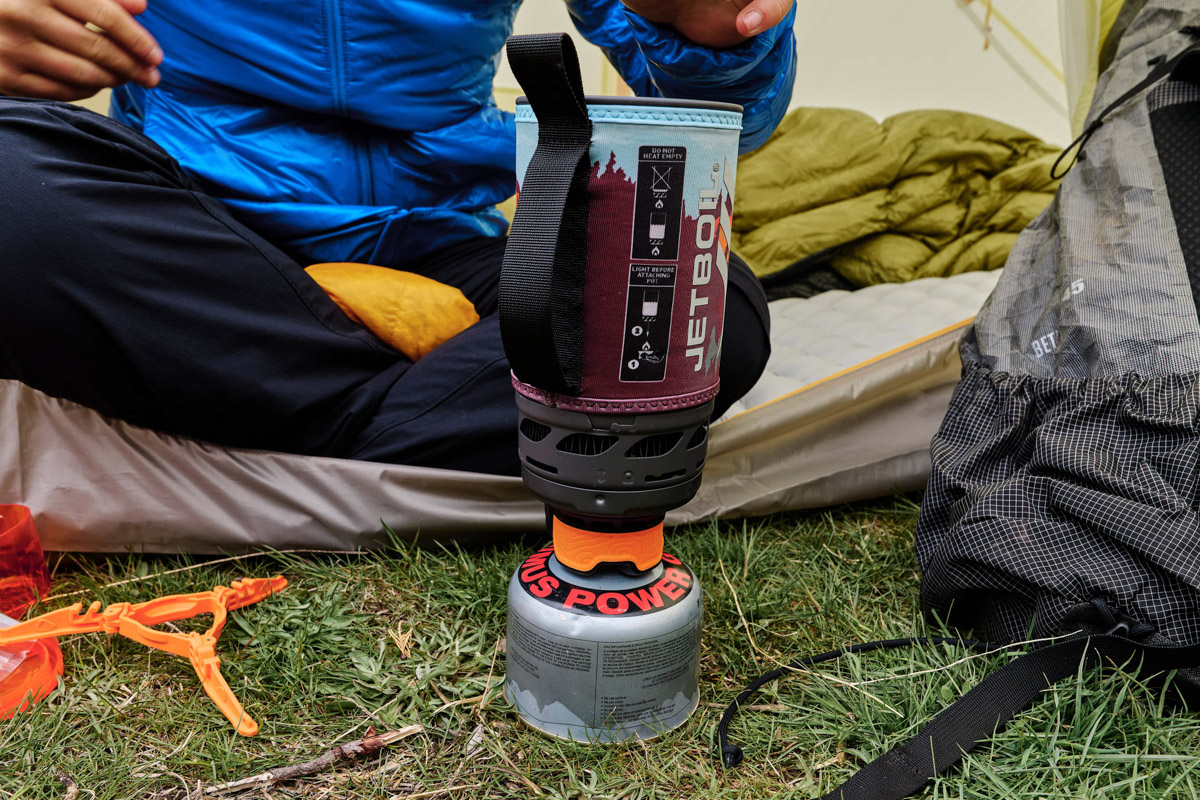
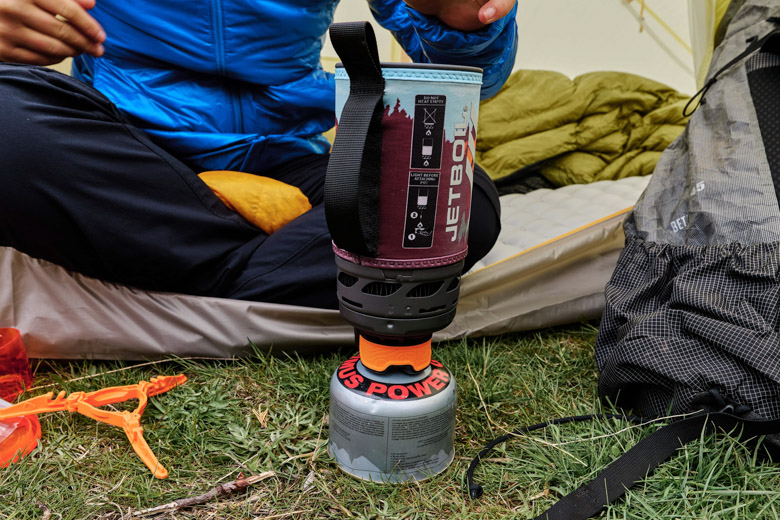
Price: $145
Weight: 13.1 oz.
Tested boil time: 4 minutes
What we like: Integrated backpacking stove that's efficient and quick, easy to use, and reliable in gusty conditions.
What we don’t: Not the lightest design, and still susceptible to the cold, altitude, and wind.
See the Jetboil Flash 1.0L at REI See the Jetboil Flash 1.0L at Backcountry
Jetboil’s Flash backpacking stove has been a classic choice for backpackers for years, and it’s easy to see why. This integrated system boasts a class-leading boil time and fuel efficiency, and its enclosed burner design gives it a boost in reliability in windy weather. The most recent update to this beloved stove furthers its ease of use: The traditional piezo was replaced by a turn-and-click igniter, and visual locking point indicators and rubber grips make the latest Flash even simpler and safer to handle. While it’s not the lightest weight or most compact backpacking stove on the market, the Flash makes boiling water for backcountry meals a breeze. I tested the latest version of this stove on several backpacking trips and high alpine missions across the American West and found it to be well worth its weight. Read on to hear about my experiences, and for a wider view of the market, see our full article on the best backpacking stoves.
There are a lot of reasons to opt for an integrated backpacking stove over a non-integrated model, but boil time and fuel efficiency are the most notable. Unlike traditional non-integrated backpacking stoves that simply hold a pot over a flame, the pot on the Jetboil Flash 1.0L locks directly onto the burner, creating a more direct connection between the flame and the pot. This also creates a barrier against wind, which can greatly affect the efficiency of the stove (read more about weather resistance below). Jetboil’s FluxRing heat exchanging pot also directs heat more efficiently into the water than traditional flat-bottomed pots (Jetboil claims it grabs twice as much power). Together, the Flash is purpose-built to boil water fast and efficiently.
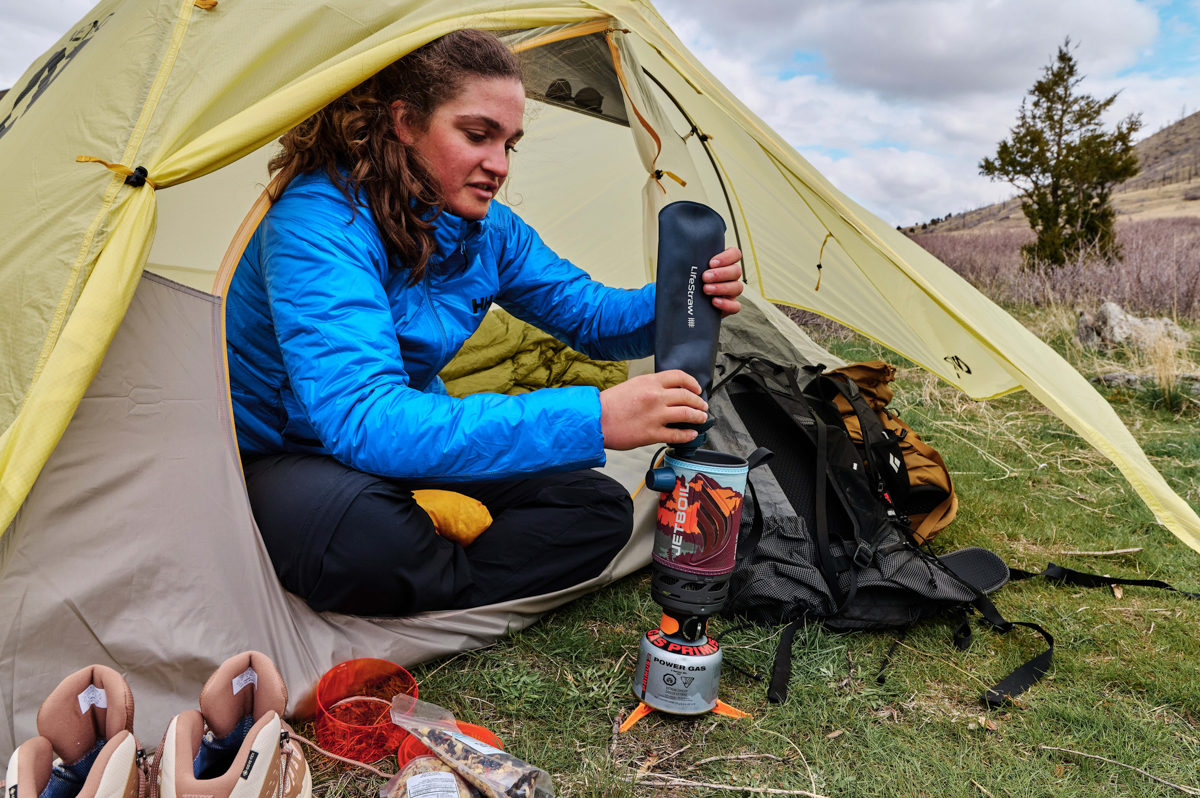
Jetboil claims the Flash can boil 0.5 liters of water in 2 minutes, and I found that claim to be mostly true. When boiling at sea level, I was able to get 1 liter of water to boil in 4 minutes. To be sure, there was some variability (once, it took 5 minutes and 45 seconds to get the water to boiling at sea level), but I found it consistently close to the 4-minute mark. What’s more, I was able to boil a total of about 9 liters of water with one 4-ounce fuel canister in a controlled environment, which was 1 liter more than I got out of the non-integrated MSR PocketRocket 2. While the PocketRocket technically has a stronger flame output than the Flash (8,200 BTUs vs. 5,300 BTUs), the Flash’s integrated design and heat exchanger pot use the heat more efficiently, meaning one canister of fuel can accomplish more.
While the Flash stands out for its efficient boiling, I didn’t find it to be the most adept at simmering. The most updated version of the Jetboil Flash has a redesigned flame regulator, which is easier to adjust than the previous version (especially when trying to keep the flame as low as possible), but it’s still pretty touchy. The slightest adjustment can have dramatic effects, and I accidentally turned off the stove entirely more than once when trying to adjust the flame. The only success I had with approaching a simmer was starting the stove with a small flame and keeping it there, but cook time was greatly sacrificed in the effort. Simply put, the Flash is too heat-efficient to maintain a steady simmer. But unless you’re a backcountry chef who plans on cooking intricate meals at camp, this isn’t much of an issue. I valued the quick boil time for my dehydrated meals and morning coffee more than achieving a steady simmer.
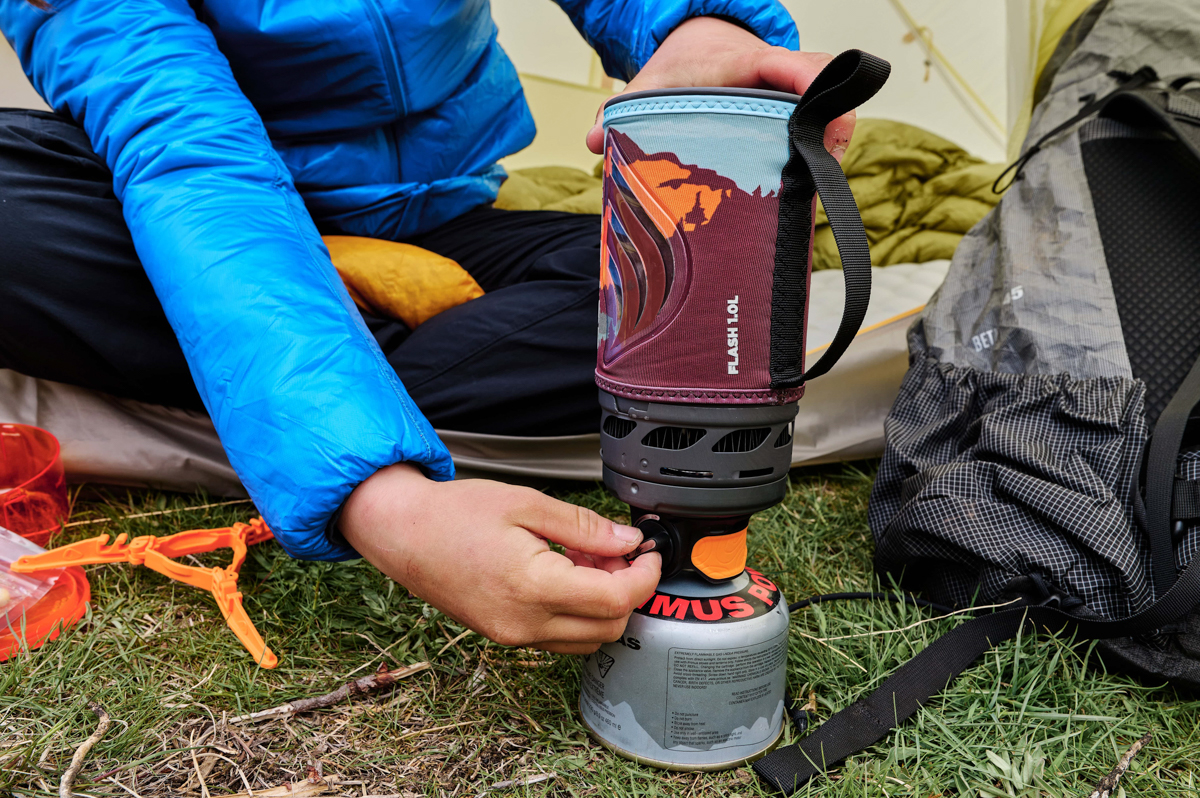
Despite enclosed burners and wind shields, gusty weather is every backpacking stove’s greatest enemy. I put the Flash to the test on several windy alpine missions and found its performance greatly affected by the conditions. To be sure, it had a better success rate than most non-integrated stoves I’ve used. I was at least able to get it to light each time, which wasn’t the case with the MSR PocketRocket 2. The main issue I ran into with the Flash was achieving a boil in the wind, and it often required some creative rock stacking to create a wind shield. While no backpacking stove is necessarily windproof, I’ve had greater success with MSR’s WindBurner stove, which has a more secure integrated pot and a gust-resistant radiant burner. That said, I wouldn’t necessarily leave the Flash behind if I were facing a blustery forecast. It might not be the most efficient in the wind, but it can still get the job done.
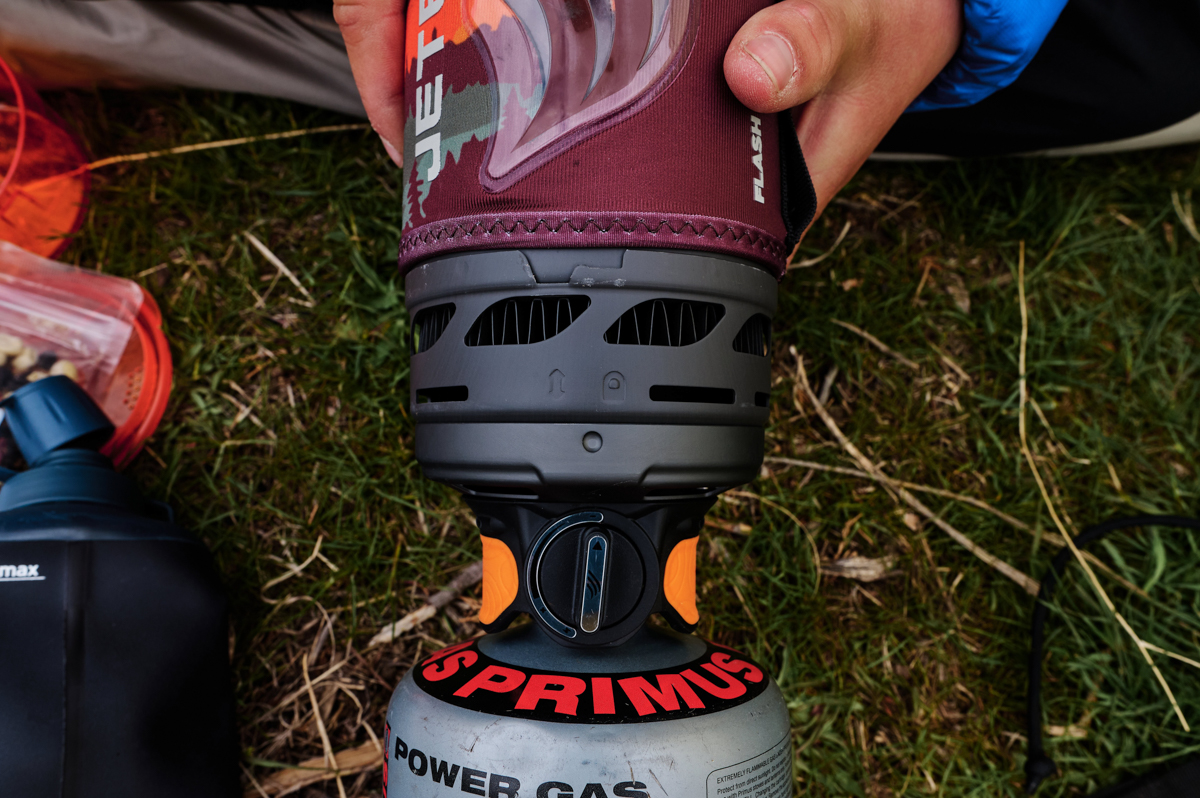
Like most canister stoves, the Jetboil Flash is also greatly affected by the altitude and the cold. Unlike white gas or other liquid fuels, canisters depressurize in the cold and at elevation, which can make for slow and inefficient boil times. However, there were a few measures I took to mitigate this issue, including storing the canister in my jacket pocket before screwing it onto the stove, and keeping it out of the snow when in use. The included canister stand helps keep the stove off the ground, but a hanging kit is even more ideal when camping in the snow. And so long as you don’t mind the discomfort, I found manually warming the canister with my hands when in use helped the stove boil faster. That said, I would hesitate to recommend the Flash as a dedicated cold-weather backpacking stove. If you want to stick with canister fuel over liquid fuel or white gas, remote stoves that allow the canister to be inverted are a better choice, like MSR’s WhisperLite Universal.
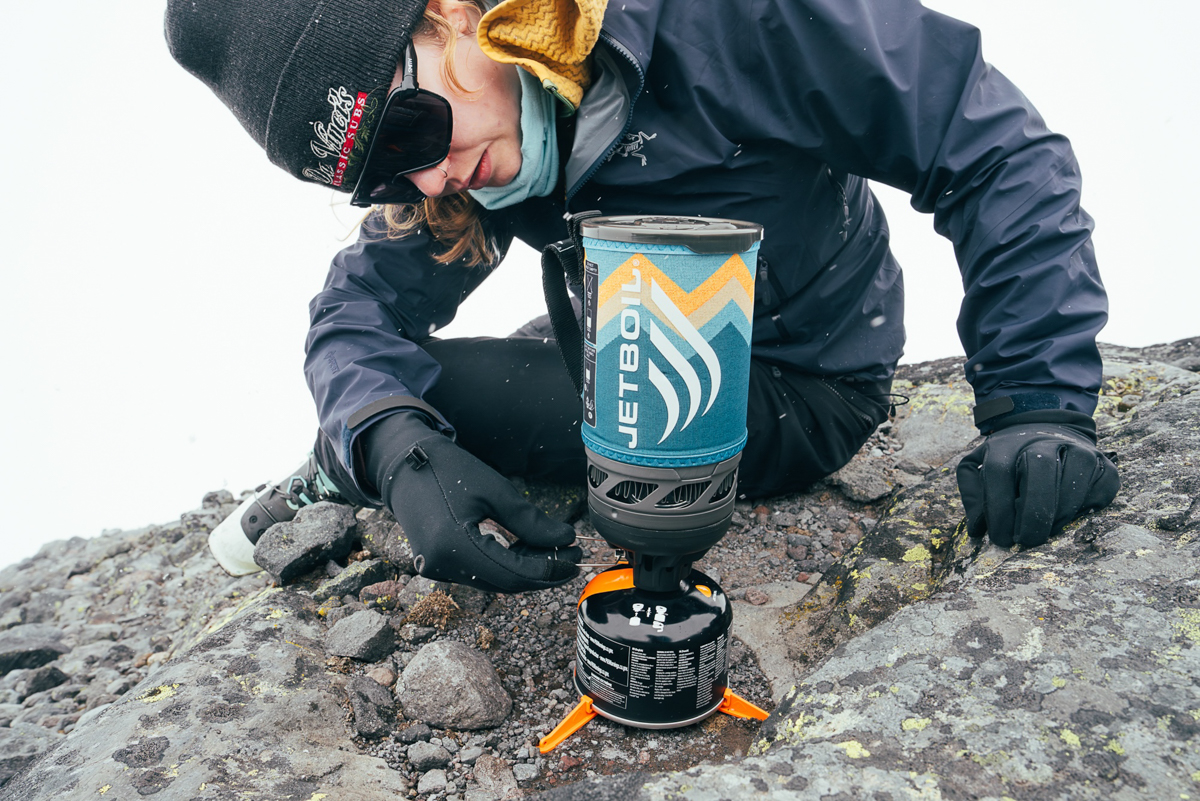
My thoughts on the weight and packability of the Jetboil Flash are somewhat mixed. On one hand, ounce-counting backpackers can save a lot of weight by opting for standalone stoves and minimalist titanium cookware. But on the other hand, the Flash’s all-in-one design makes it tough to pass up. The 13.1-ounce weight includes the stove, the pot, a lid, and a plastic measuring cup (note: the fuel canister and pot supports will add a few ounces). All of the Flash’s components (including the canister and supports) nest inside the pot too, which has the packed dimensions of 4.25 inches by 7.5 inches. To be sure, it’s neither the smallest nor lightest setup you can find, but in my opinion, the benefits of the integrated system make it worth the weight. If weight is not a concern for you, Jetboil offers several compatible accessories, such as a Silicone Coffee Press, which weighs just an extra 1.3 ounces.
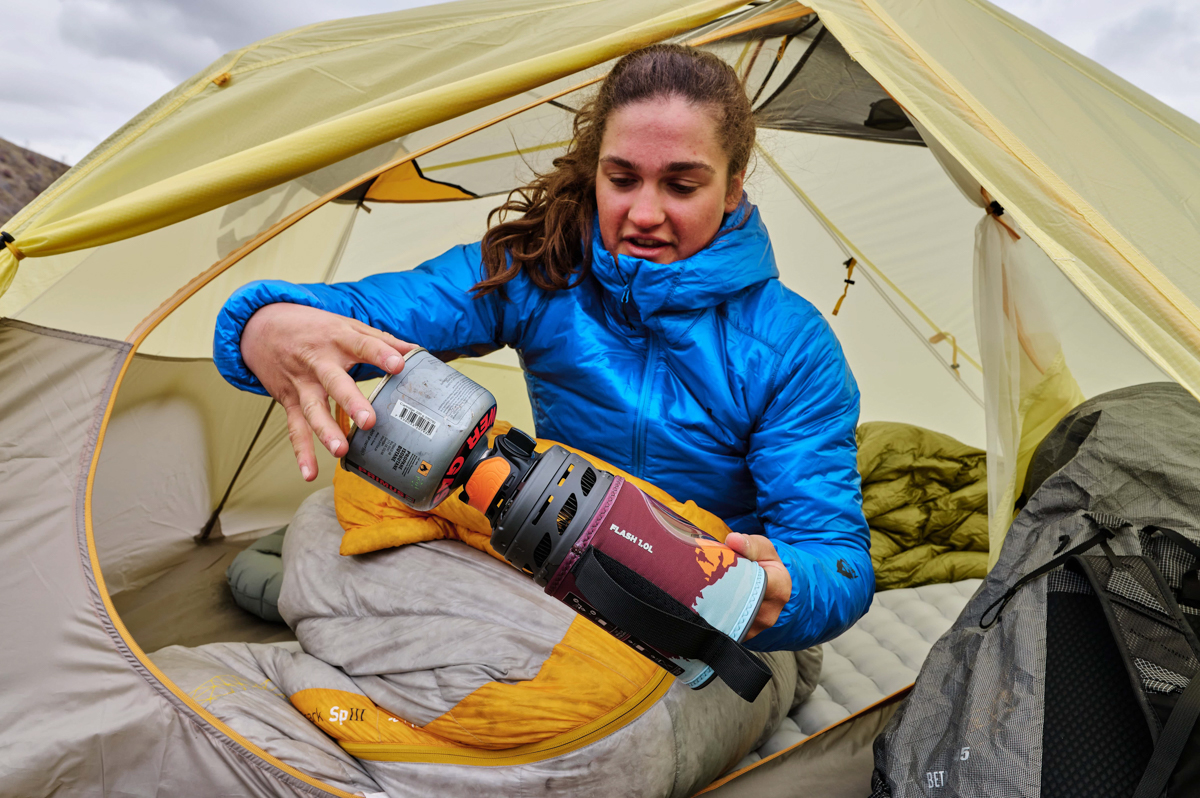
The Jetboil Flash has always boasted an easy-to-use system, but the most recent version features several more user-friendly upgrades. Most notably, Jetboil replaced the traditional piezo with a turn-and-click igniter reminiscent of a home stove. This new igniter is not only easier to use, but it's also more reliable than the last design, which failed on me after just a few uses. The Flash’s pot cozy allowed me to handle the pot easily with boiling water inside and even provided a bit of short-term insulation. The color-changing heat indicator on the side of the cozy is a nice touch, though I didn’t find myself relying on it since it’s pretty easy to tell when the water is boiling. Jetboil added a few other safety measures too, including rubber grips on the stove, three locking points on the burner, and visual indicators that make it painless to check if the pot is locked onto the stove correctly. The inside of the pot and the plastic bowl have measurement markings in both milliliters (up to 500mL) and ounces (up to 16 oz.), which makes measuring out water a breeze. Put together, the Flash is an extremely intuitive design, and set-up is as easy as unpacking the pot, screwing on the fuel canister, attaching the pot, adding water, and lighting the igniter.
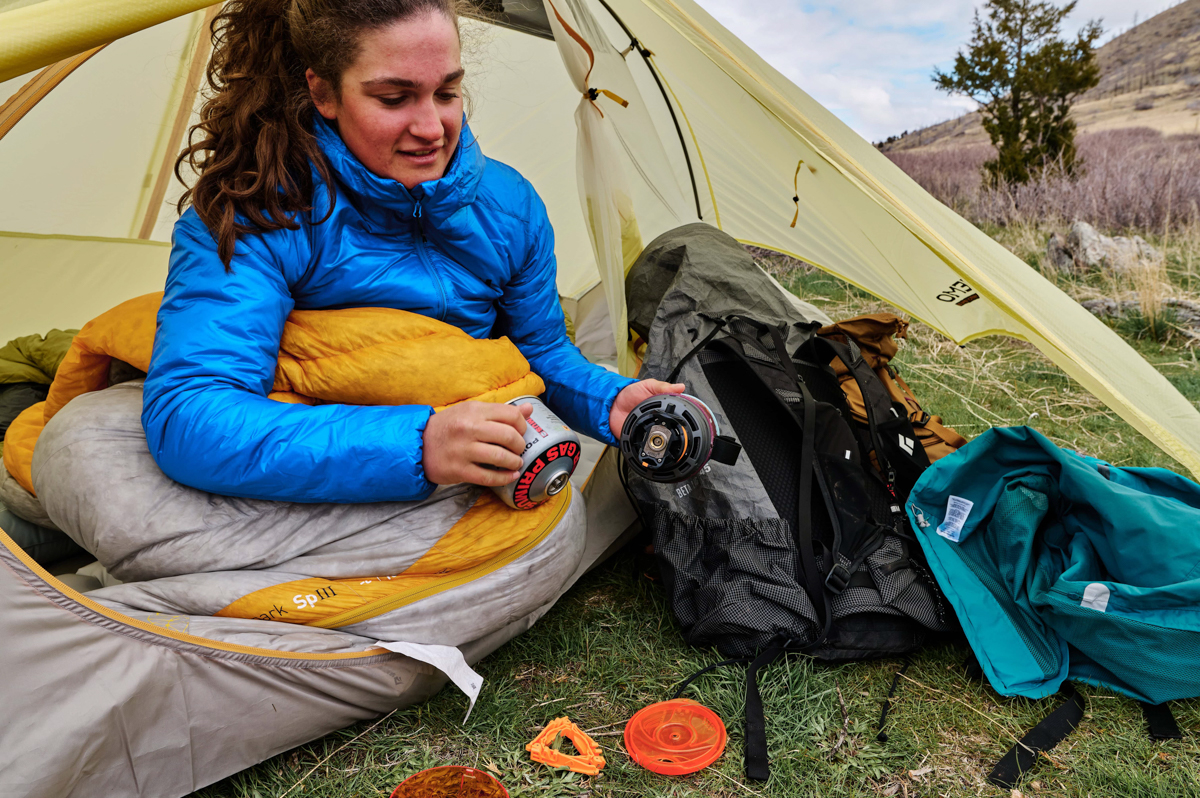
While I haven’t had the chance to test the Jetboil Flash over a more extended period, I’m already optimistic about how it will hold up. The entire system feels hard-wearing and thoughtfully constructed, and I’m particularly impressed with the new igniter. Not only has it proven more reliable than the last iteration, but it has also been more reliable than most other stoves I’ve used. The only concern I’ve run into so far is a small dent that’s formed on the bottom of the pot. I’m not sure exactly what caused it, but it doesn’t seem to affect the performance of the stove so far. I’ll keep an eye on the dent and report back if it worsens.
Beyond the choice of cozy color, Jetboil doesn’t offer any other versions of the Flash, and it only comes in a 1-liter volume. For a small bump in price, you can get the Flash Java, which includes the silicone coffee press with your purchase. If you’re looking for a smaller pot, Jetboil’s Zip 0.8L features the same burner and pot tech as the Flash, but the pot is slightly smaller at 0.8 liters. It’s also worth noting here that Jetboil sells the components of the Flash separately, if you’re ever in need of a spare. You can get a new cozy, pot, burner, and lid on their site.
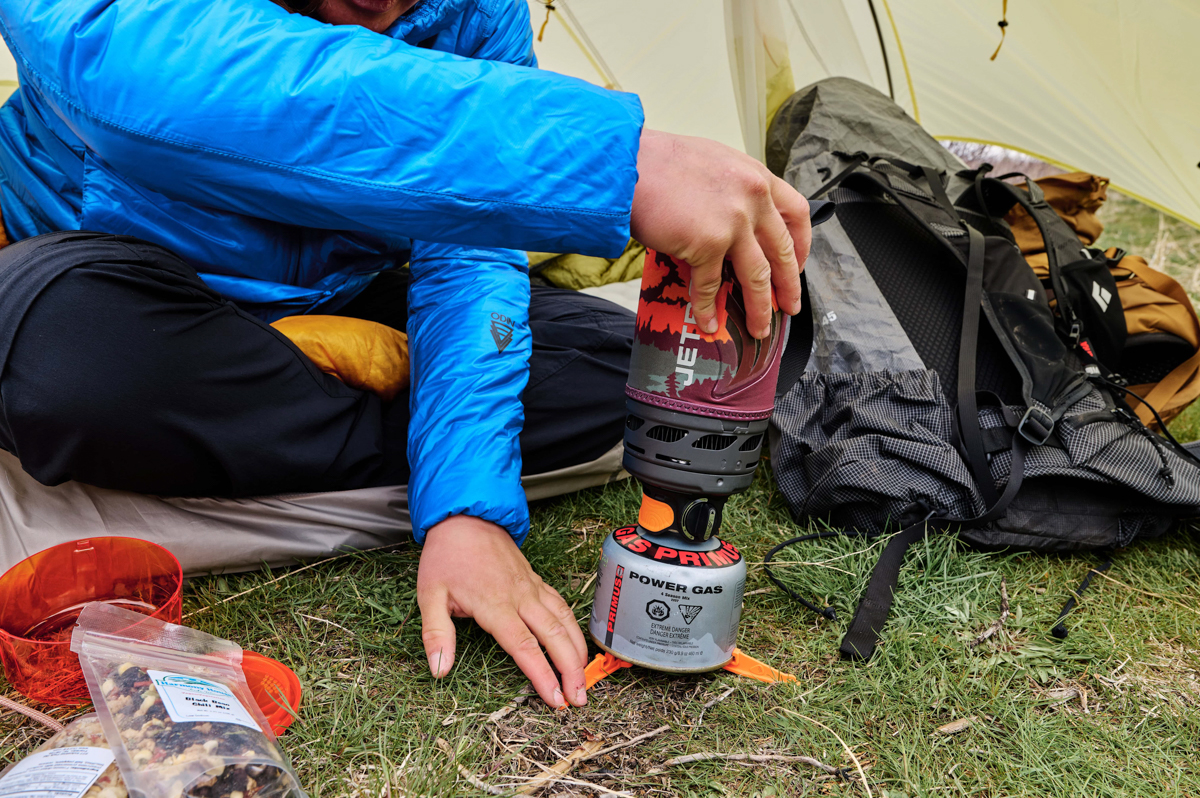
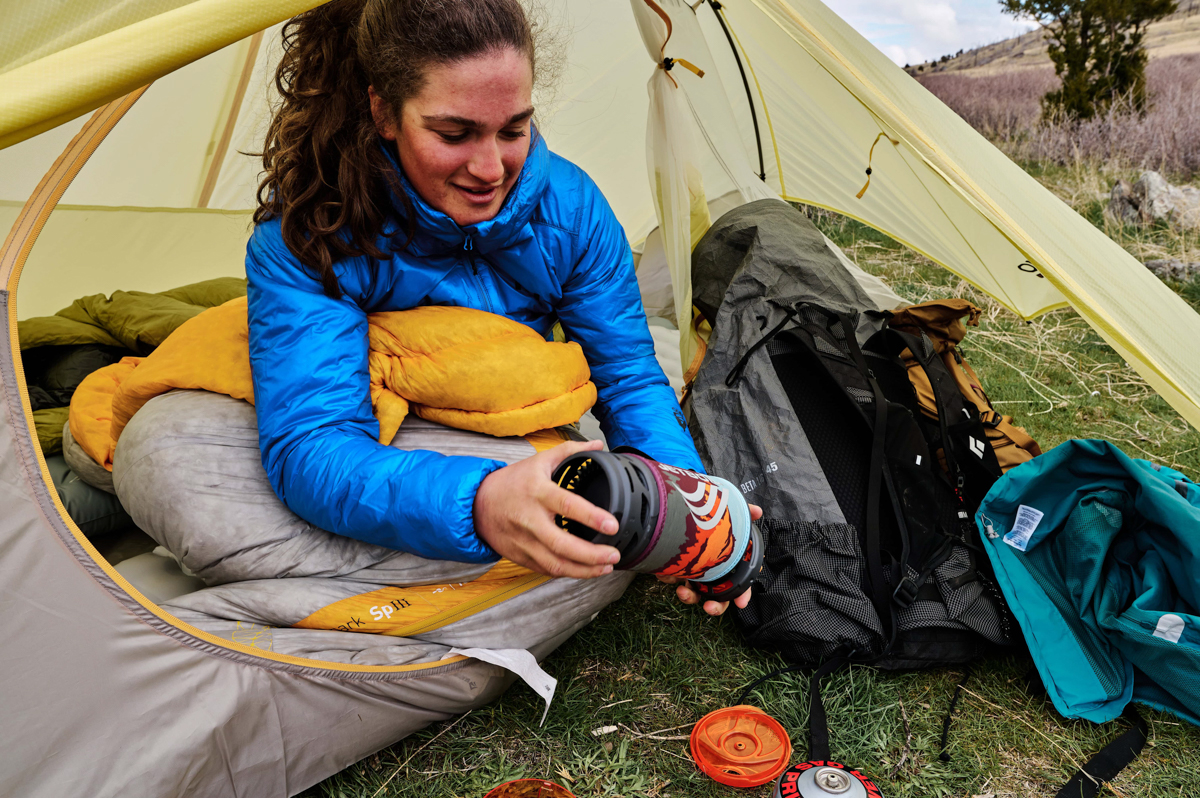
| Stove | Price | Weight | Fuel Type | Auto Ignition | Pot | 1L Boil Time* |
|---|---|---|---|---|---|---|
| Jetboil Flash 1.0L | $145 | 13.1 oz. | Canister | Yes | Yes | 4 min. |
| Jetboil MiniMo | $180 | 14.6 oz. | Canister | Yes | Yes | 4.5 min. |
| MSR WindBurner | $200 | 15.3 oz. | Canister | No | Yes | 4.5 min. |
| MSR Reactor 1.7L | $290 | 1 lb. 1.0 oz. | Canister | No | Yes | 3 min. |
| MSR PocketRocket 2 | $50 | 2.6 oz. | Canister | No | No | 3.5 min. |
*Editor's note: This number represents claimed boil time for 1 liter of water. In real-world use and depending on conditions, we've found these times to be quite a bit higher.
Jetboil’s Flash is a go-to choice for backcountry travelers thanks to its reliability, ease of use, and efficiency, but the backpacking market isn’t short on alternatives to consider. Within Jetboil’s lineup, the MiniMo Cooking System has impressed us with its simmering capabilities, which is something that the Flash lacks. Unlike the Flash’s touchy temperature regulator, the MiniMo takes four full turns to crank the stove to full force, which makes it easier to find the optimal simmering temperature somewhere in between. But despite featuring a heat-exchanging pot and integrated design, the MiniMo isn’t as quick or efficient as the Flash. Backcountry chefs might find the tradeoff worth it, but the majority of backpackers who stick with dehydrated meals will find more value in the speedy Flash.
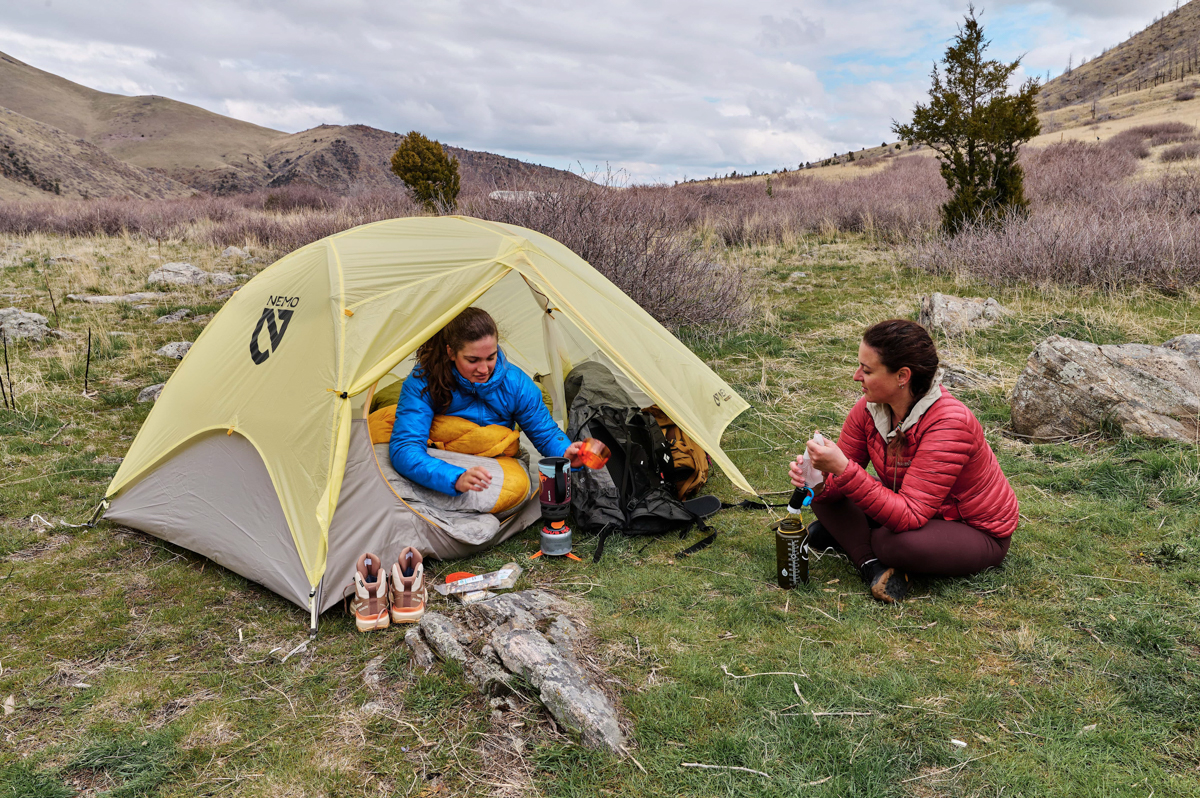
MSR is Jetboil’s direct competitor, and their WindBurner and Reactor stoves both succeed in areas the Flash suffers. As the name suggests, the WindBurner is purpose-built for reliability in windy conditions: Its integrated system blocks out more wind than the Flash, and its radiant burner ditches the flame altogether. Like the Flash, the WindBurner comes with a 1-liter pot in which the stove, fuel, and accessories can be nested. That said, it’s heavier, pricier, not as quick or efficient, and not as user-friendly as the Flash (it doesn’t have an igniter, for instance). If you’re headed snow camping, MSR’s Reactor features a more powerful burner (9,000 BTUs) that can tackle cold temps and snow melting with ease. It also uses MSR’s radiant burner, which can handle wind better, too. That said, the Reactor is also heavier and pricier than the Flash, and it’s overkill for most fair weather missions. And it still can't match the cold resistance of a white gas or liquid fuel stove.
Lastly, we think it’s worth giving a nod to MSR’s PocketRocket 2 for the ultralight backcountry travelers. This minimalist non-integrated stove weighs just over 2 ounces and packs down to about the size of a granola bar. You do sacrifice fuel efficiency and boil time (we timed 4.5 minutes to boil 1L of water), and you’ll have to buy your own pots, lids, and other accessories. Not to mention, the exposed flame is far more susceptible to gusty conditions. We pitted the last iteration of the Flash and the PocketRocket 2 against each other on a spring ski tour on Mount Rainier and found the Flash to be the clear winner in terms of reliability in stormy conditions. As long as you don’t mind the extra weight, the Flash is the more reliable choice, which is crucial for safe backcountry travel.
Back to the Jetboil Flash 1.0L Review See our Backpacking Stoves Guide